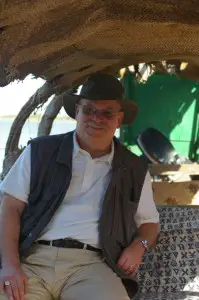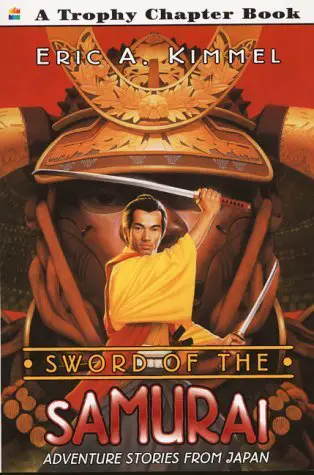 Eric A. Kimmel is an American award-winning children’s books author born in 1946 in Brooklyn, New York. He has published more than 50 books for children, many of which have won numerous state awards and appeared on school and library recommended lists. In Asia, he is known for The Sword of the Samurai, a book of adventure stories set in Japan, and Three Samurai Cats: A Story from Japan. In this interview he talks about his passions for children’s stories, Japan, the future of books, writing, and his fans.
Eric A. Kimmel is an American award-winning children’s books author born in 1946 in Brooklyn, New York. He has published more than 50 books for children, many of which have won numerous state awards and appeared on school and library recommended lists. In Asia, he is known for The Sword of the Samurai, a book of adventure stories set in Japan, and Three Samurai Cats: A Story from Japan. In this interview he talks about his passions for children’s stories, Japan, the future of books, writing, and his fans.
“I have come to realize the importance of simple storytelling.”
Voicu Mihnea Simandan: You have been a story writer for most of your life. How has your writing evolved over time?
Eric A. Kimmel: More and more over the years I have come to realize the importance of simple storytelling. Part of this is because I mostly write picture books. Picture book texts have to be very lean. There just isn’t room for anything more than the basic story. Also, the illustrations are going to provide what would normally be the setting and the characterization. Essentially, you’re writing in a very small space. It looks simple, but it’s hard to do well.
Also, children are naturally drawn to stories. Tell me a story. Give me an interesting character, one that I care about, and give that character a problem to solve. Make it a problem that forces the character, and the reader, to think. Write a story that will make the listener say at the end, “That was a really good story. Tell it again.” If I can make my reader say that, then I know I’ve done my job.
Since we live in a digital age, you often see movies, videos, and video games relying heavily on technological effects. However, without a good story even the best of these become so much noise. Visual effects that lack a solid story soon become boring. So you see, sooner or later it always gets down to the oldest and most basic literary form: storytelling.
That’s what I tried to do in all my writing. Just tell a story, and tell it well.
“Samurai could be horrifically violent.”
 VMS: Where did the inspiration for The Sword of the Samurai come from?
VMS: Where did the inspiration for The Sword of the Samurai come from?
EAK: The inspiration for Sword of the Samurai comes from two different places. I always love Japanese samurai movies. When I was in high school I would run to see the latest Akira Kurosawa film. Exciting stories filled with action were really all I knew about Japanese history, but they were fun to watch.
In 1997 I was invited to Japan to speak to children at international schools in Tokyo and Osaka. This was my first time in Japan and I was stunned by what an amazing culture Japan has. You could go from a medieval castle to a roaring modern nightclub district by walking a few blocks. I couldn’t get enough of Japan. I had a wonderful time.
One afternoon, when I had some time off, I visited the National Museum in Oeno Park in Tokyo and had a chance to see the magnificent exhibits from the samurai period. I was so inspired. I wanted to learn more. So when I got home I checked out every book about the samurai I could find. I started collecting stories and researching the history, the clothing, the religion, the architecture, and everything else connected with the era.
After a while, I began collecting some of my favorite stories and assembling them in book form. Through these stories I try to show the paradoxes and contradictions that were part of being a samurai. Samurai could be horrifically violent. But they also wrote fine poetry, had a genuine feeling for the beauty of nature, and followed the teachings of Zen Buddhism, which emphasizes stillness and inner tranquility.
I think I did a good job. The book has proved to be very popular and it’s still in print. Maybe one day I’ll see a Japanese edition.
“I learned what it was like to be totally out of your element.”
VMS: Tell us more about your 1997 trip to Japan. Have you returned there?
EAK: My 1997 trip to Japan was my first trip to Asia. Unfortunately, I haven’t had a chance to go back to Japan, but I have been back to Asia. I’ve been to China twice, visiting Beijing, Shanghai, and Xian. I’ve been to Singapore and Malaysia. In every case I’d go back in a heartbeat. There also many places that I haven’t been that I would love to see. There’s Vietnam, Thailand, and India. To tell the truth, I’ll go anywhere. I know there’s always a new adventure waiting.
The most interesting thing about my trip to Japan, besides being exposed to Japan’s amazing culture, is that I learned what it was like to be totally out of your element. In many ways I felt like a visitor from Mars. I couldn’t read any of the signs. I couldn’t count on finding someone who spoke English. And as anyone who has traveled in Japan knows, make sure you’re carrying the card of the hotel or the place where you’re staying and that directions to get there are written on the back. Because, if you get lost, there is a good chance you’ll never be seen again.
At the same time, all the Japanese people we met were so amazingly kind. They went out of their way to help this dumb foreigner get to the right street, to the right shop, to the right train. I have never forgotten that. Since then, my wife and I have always made it a point to watch for visitors from other countries. If they look lost or confused, and may not speak the language well, we make it our business to help them get to where they want to go. We learned that courtesy from the people of Japan and it’s something I will always remember.
“The thought of a major city like Tokyo with its millions of people having to be evacuated is horrifying.”
VMS: In the light of the recent natural and nuclear disasters that have stuck Japan, what thought do you have for the Japanese people?
EAK: My heart breaks for the people of Japan. My greatest fear is that we’re not being told the truth about the extent of this disaster. Two good friends of ours live in Tokyo. They e-mailed us to say that they monitor the online Geiger counter every day, checking the radiation levels. If need be, they are prepared to evacuate the city to stay with relatives in western Japan. The thought of a major city like Tokyo with its millions of people having to be evacuated is horrifying. Where will all those millions of people go?
I watched a very sad story on the news tonight. An elementary school in Japan had finally reopened, but 80% of the children had been swept away by the tsunami. Imagine returning to school to learn that your friends and classmates are gone and only you and a few of your friends and teachers had survived.
I watch the news every day, hoping that the crisis will pass and that rebuilding can begin. I’m sure most of the people of the world feel the same way.

